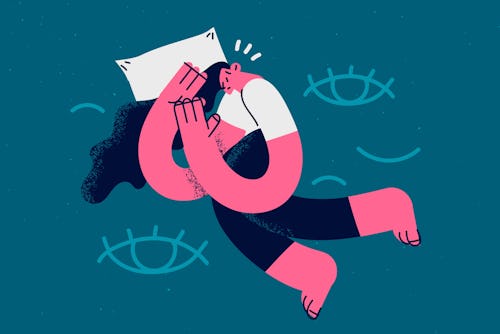Can you talk yourself into getting better sleep?
CBT-i, a simple therapy technique, might actually save you from insomnia.

More than 70 million Americans deal with insomnia. We’ve tried supplements and bedtime stories and maybe we’ve even desperately guzzled Nyquil when we were sick to catch a few hours of blissfully fitless sleep — not that I’d know anything about that, personally, or anything. But what are we supposed to do if we don’t actually want to resort to sipping on the syrup long-term?
What is CBT-i?
Cognitive Behavioral Therapy for Insomnia, better known as CBT-i, is a drug-free approach that therapists use — but does it actually work? I asked experts to explain whether the practice can actually offer us relief from insomnia.
“Yes, CBT-i does work with the majority of my clients,” says Annie Miller, a psychotherapist in Bethesda who specializes in sleep, trauma, and chronic pain. Miller says that many of her clients have described CBT-i as “life changing,” and research shows that CBT-i can be up to 75% effective in helping people improve sleep. Nothing works for everything but in the world of therapy, 75% is a huge success rate, Miller explains.
How does cognitive behavioral therapy for insomnia work?
CBT-i essentially works by changing thoughts and behaviors around sleep, Miller tells Mic. In other words, CBT helps people change the way they think — in this case, about sleep — and then helps them adjust their habits, which results in changed sleep patterns. Sounds easy, but it does require work. If you could just fall asleep, after all, you probably would. People who have insomnia, by definition, can’t “just do” sleep.
It’s helpful to learn some of the reasons that people develop insomnia in order to understand how CBT-i works. “Insomnia develops primarily because we are afraid of what will happen if we don't sleep and as a result, we do things that inadvertently make insomnia worse, like lying in bed trying to sleep or worrying about sleep,” Miller explains. CBT-i works by treating the root of the problem: the thought process around sleep.
As you might imagine, learning to change your thoughts and habits around sleep requires some instruction. “CBT trains people to use techniques that address the mental — or cognitive — factors associated with insomnia, such as the 'racing mind', and to overcome the worry and other negative emotions that accompany the experience of being unable to sleep,” explains Colin Espie, professor of sleep medicine at the University of Oxford.
How long does the process take?
Traditionally, CBT-i is delivered over the course of six to eight weekly sessions with a trained therapist, Espie explains. Miller and Espie agree that it’s probably best to work with a trained therapist, but there are also a lot of CBT-i telehealth and app options that may help if that’s not accessible for you. You can also employ some CBT-i techniques on your own.
“There are cognitive behavioral therapy techniques that anyone can do without requiring a licensed CBT therapist,” says Espie. If you have insomnia, Espie says you can do things like “putting your day to rest,” for a start. “By spending 10 minutes or so at the end of your work day tying up loose ends — such as making a list of everything you need to do tomorrow — you can quiet a racing mind and fall asleep faster,” Espie says. Espie says that this simple advice is an informal kind of cognitive-behavioral therapy that can help you get to sleep better.
Espie also recommends having an evening ritual. Creating a wind-down routine — that may include breathing exercises, reducing blue light from screens, eliminating caffeine and alcohol before bedtime and intentionally relaxing as you settle into bed — is a CBT-style approach to dealing with insomnia, says Espie. If your bedtime ritual doesn’t put you to sleep, he says, try getting out of bed and doing a light activity until you feel tired, rather than tossing and turning.
CBT-i is a fancy, technical-sounding name, but this advice sounds like common sense to me, and it sounds more sustainable than taking sleeping pills. Miller and Espie agree that CBT-i is a better solution than prescription sleep aids — and studies suggest that it’s also a more permanent one because it addresses the actual cause of insomnia instead of just the symptom. Or, as Miller says, “When patients have insomnia, they typically go to a sleep doctor and are prescribed medication, which can help but it just covers up the problem.”